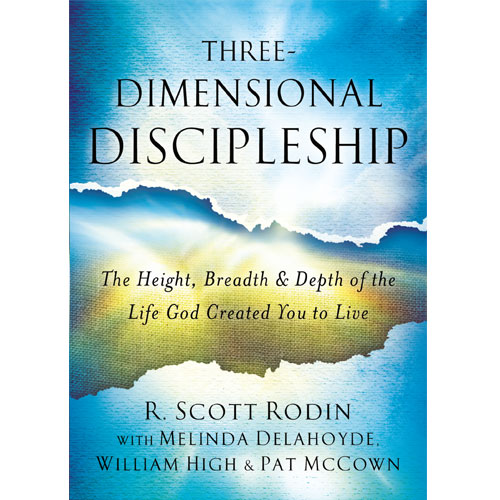Steward on the Mound, Part II
Part Two of my Interview with World Series Pitcher, Jeremy Affeldt

We are considering the challenges leaders face in keeping their focus on their identity as a child of God and not being swayed by the temptation to tie their identity to their job. We teach the following axiom,
“Steward leaders refuse the temptation to tie their identity to their jobs.”
This is a significant battle for so many in leadership. So I was pleased to spend time with Jeremy Affeldt, former pitcher and World Series star for the San Francisco Giants as he discussed his own struggles to keep his identify as husband, father and child of God in the hero-worship culture of professional sports. This is second half of our interview.
Scott: You had times of great success and times of discouragement, frustration and even failure in the context to your profession. Did you find that keeping that identity as a holy and righteous person was harder in times of success or in times of failure?
Jeremy: Definitely failure. Success is a lot easier. Failure is really tough because it challenges your identity. Success I think helps solidify it like, “I am holy and righteous and I am a great baseball player.” But now when you’re failing legalism kicks in. You begin to ask “maybe I am not reading my bible enough and maybe I am not praying enough.” Or “maybe God’s trying to wake me up. Maybe I am sinning too much.” But in scripture he always views you as holy and righteous because the blood of the lamb is on you, therefore he sees you as holy and righteous.
Scott: Even when you fail.
Jeremy: Right. You are going to have earthly consequences for poor decisions but in the heavens you’re still holy and righteous! And that is where I think we have a hard time connecting. I think when we fail we tend to revert back to the legalistic, pharisaic mentality of ‘do more’.
Scott: How’s the best way to escape that?
Jeremy: God said ‘it’s finished’. Jesus said ‘it’s finished’. So he’s not asking you to do anything because if you have to do something, then you can brag about you becoming great. He says, ‘it’s all me, you didn’t do anything’. And he says ‘I have given you your identity’. I believe that Jesus died on the cross to save our identity forever.
Scott: You are speaking to this idea when you are talking about freedom. We teach that freedom and joy are the two characteristics of a steward leader. The freedom is that sense that I am who I am in Christ regardless of the role I play, regardless of the success or failure I experience. There are a lot of reasons I might succeed or fail. I can hang a curve ball, right? But there is that distance between my identity in Christ and what I do, how well I do it and whether I succeed and fail.
Jeremy: Yes, that’s right.
Scott: And that’s a sense of freedom, I phrase that as being a steward of my life. So we are stewards of our occupation. God gave you an incredible arm, and calls you to steward that gift. That gift doesn’t determine your identity, but the moment we become an owner, and we begin to say, ‘my identity is in what I do’, the freedom is gone.
Jeremy: That’s correct.
Scott: The result is bondage, absolute bondage. Would you agree?
Jeremy: Yes, and I think that you make a great point, freedom and joy that you see from people. I think you can see people that look like they are very successful but they are in bondage. I mean look at the suicide rates; look at the overdoses, because they are trying to kill pain. They can be successful on the outside but their freedom is not there. You can see it in powerful leaders that have paid tremendous amount of money and then make poor moral decisions. They kill themselves because of what they have done. They have poor marriages. They don’t know their kids. They look like they are successful but there is no freedom and joy. I really like that, I can see guys that have a lot of freedom and joy, and honestly I’ll see a guy that’s makes $50,000 a year with two kids and a house that has tons more joy than a millionaire. Because he is free man.
Scott: He knows who he is in Christ and he is secure in that.
Jeremy: Yes, and when I know who I am and my identity is in Christ and I love my family and my family is thriving and we are just having a great time I think there is something so true to that.
Scott: The other thing you spoke to that’s very much in line with the steward leader is the difference between being and doing. And how much we have become a doing driven society, where our success and our value in our world is totally based on what we do and not who we are. I think, however, that God is more concerned about the people we are becoming, being shaped and formed and conformed to the image of Christ. How did you handle the focus on performance; the metrics, the measurability all the rest of it?
Jeremy: I think that was the hardest thing. I know everybody has to perform at their jobs, but you know baseball, I mean sports, that’s all it is.
Scott: What have you done for me lately?
Jeremy: Exactly. It’s about as measurable of a performance as you can possibly get isn’t it? And that’s really hard because you’re trying to understand who you are and live as a man of faith according to the principle that God does not bless you based on your performance. Then all you do is perform. It’s hard because the kingdom mentality and the sport mentality are exact opposites.
Scott: I can see that.
Jeremy: Sometimes I asked God, “why do you ask me to do something that is totally opposite of kingdom thinking. What are you trying to do here?” It was a battle for me all the time because I was always trying to perform and yet I was always wondering ‘am I reading my bible because I want to know you or because I want to throw better?’ There are a lot of really tough decisions to make and you have to have faith and understanding. He does not bless you based on how many verses you know. He is asking you to read scripture because he wants you to walk in wisdom.
Scott: So how do you handle the constant measurements and keep your identity?
Jeremy: I am gonna mess up, I am going to sin. It’s okay and I want my children to know, this house isn’t supposed to be a place where you have to be perfect or else because daddy is not perfect. So if I’m not perfect, how do I expect you to be. Their identity is different now. To me, son, you are awesome. And all three of my boys are all awesome. We are going to love each other and we are going to live in grace. And we are going to forgive, and we are not going to say ‘shame on you’. That word is not allowed in my house. Never to my wife or children will I ever say ‘you should be ashamed of that’. No! That’s bad theology and there is no identity in shame, there is never a good identity in shame. And I think that shame keeps CEO’s, business people, people of leadership from thriving and knowing who they are because they are so ashamed of maybe decisions that they’ve made. And they don’t they’re holy and righteous in Christ. That’s who you are.
Scott: That fear of failure is huge.
Jeremy: Oh yeah. Think about if people talked about you in the newspapers you when you don’t do your job well. TV, ESPN making fun of you. There is so much shame of not coming through, earning your contract, your salary. These guys are making six, ten, fifteen, twenty million per year. But I am going to give you the reality that I tell fans, let me give you the reality. If I tell you I’m going to sign you for ten million dollars and I’m publicly announcing it, you would take it, right? And most people say, “Absolutely.” I would too. And now they hand you a ball and say, ‘by the way, you are getting ten million dollars, you better add up to that’. Immediately you pucker a little bit and you are like, ‘I don’t know if I can do this’. Because someone put a value on you, and said perform or we will trash you in front of millions of people saying, ‘why are we paying this guy so much money?’ How dare you sign this guy! You know he can’t throw a strike and all of sudden its just constant judgment based on what someone says you should be performing at based on the value I set on you.
Scott: How can anyone handle that kind of pressure all of the time?
Jeremy: I can’t even hardly handle it. It’s a lot of stress. Oh man, 7-8 years into the major leagues. I was so scared of failure. It drove me but it also caused so much like anxiety and doubt, and it was surely by the grace of God. There is nothing else that he gets me through. He says, “Jeremy, I just want to let you know, think about all these doubts that you come up with, and all these failures, and all the times you messed it up, and all the times you wanted to quit, no matter what, you continue getting a contract and a raise.” It didn’t matter what my numbers were, I always got a raise. And obviously if my numbers were really good I got a massive raise. Sometimes I have to look back and say that’s a perfect example of identity, because even when I fail God still says, “I have a plan for you because you gotta realize you’re playing in a performance based world but I control whether that door opens for you or closes. So know that you are holy and righteous and I am loving and I am smiling at you. You can have your worst year and I still want you to play because there is impact there for you and its coming.” I just have to trust that. Man, I went out there and pitched and no matter what the pressure was, I was like, “God, I am all in here and I am going to make my best pitch, but I can’t control anything.” So I just went out there and competed and didn’t worry so much about outcomes all of the time, or what If I mess up.
Scott: Do you think because you were able to keep that thing separate and know some of that peace in the midst of it that it gave you the ability to perform at a greater level?
Jeremy: I think the thing was that I knew who God said I was. I think I really did do it better in baseball because it was like, “I have no choice here but to trust.” No matter how I feel warming up, once I go to the game and its that’s wrong, you gotta figure out how to get it done, you have to figure something out. It was that trust in God that just allowed my platform to be what it’s going to be and ask him for wisdom. But really I had to relinquish control, I had to take the ownership out of it, in your words, and get rid of it and steward the game of baseball.
Scott: That’s a great closing comment. An athlete who is paid because of his control became successful by learning to give up control. Thanks, Jeremy.





